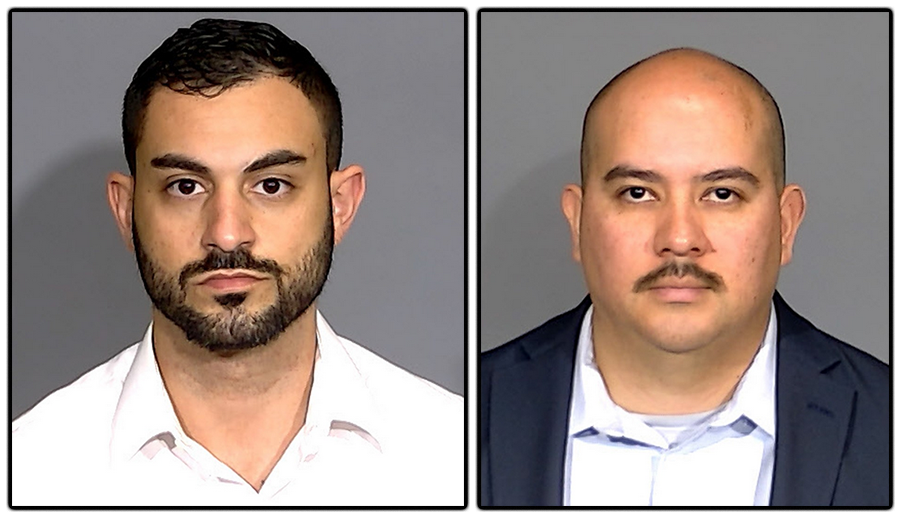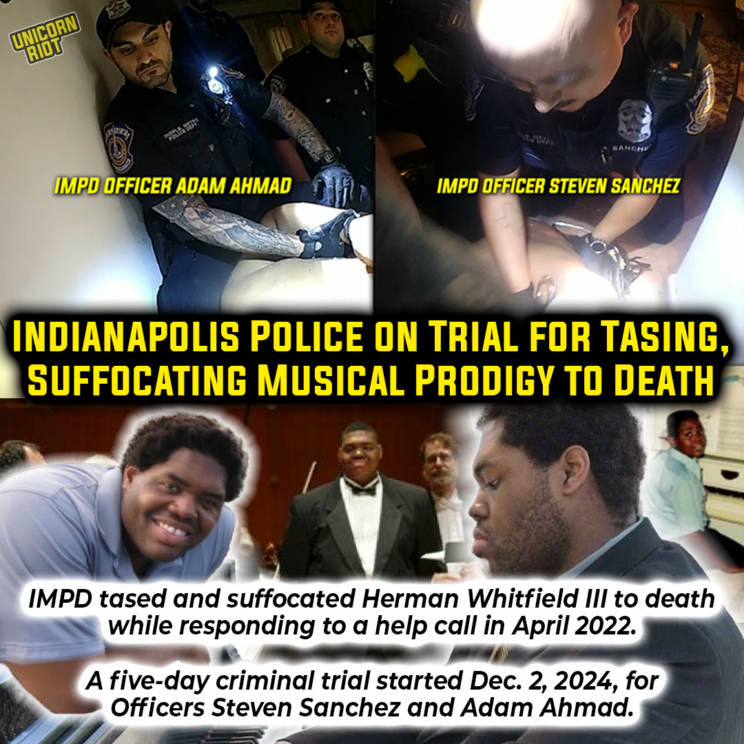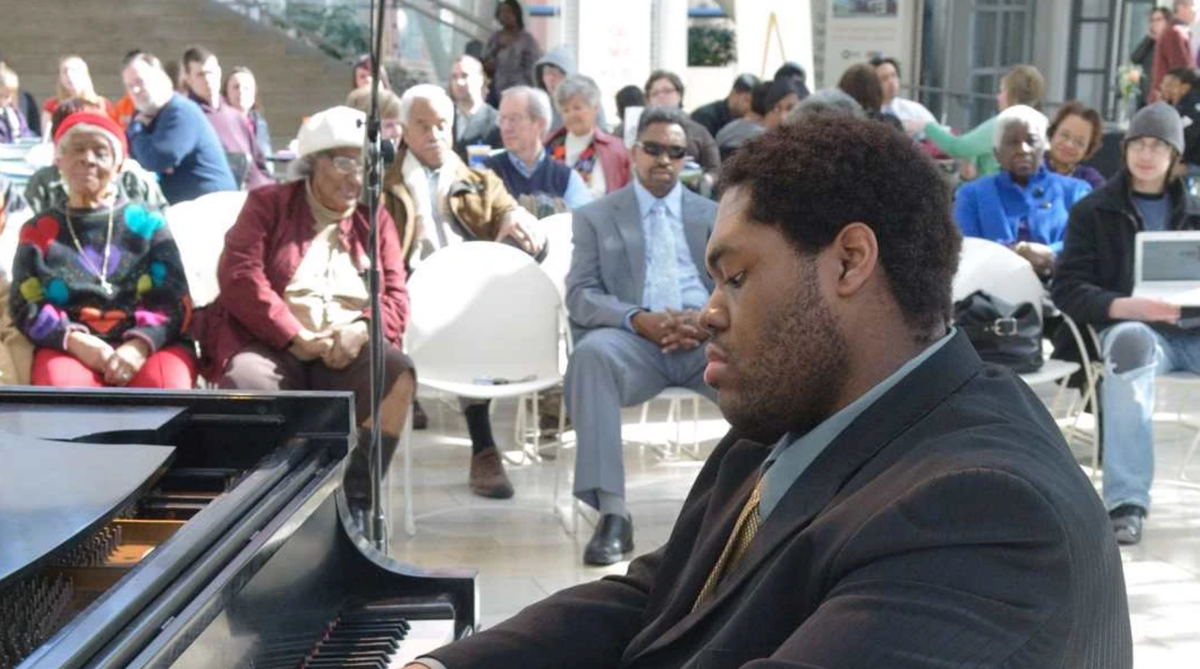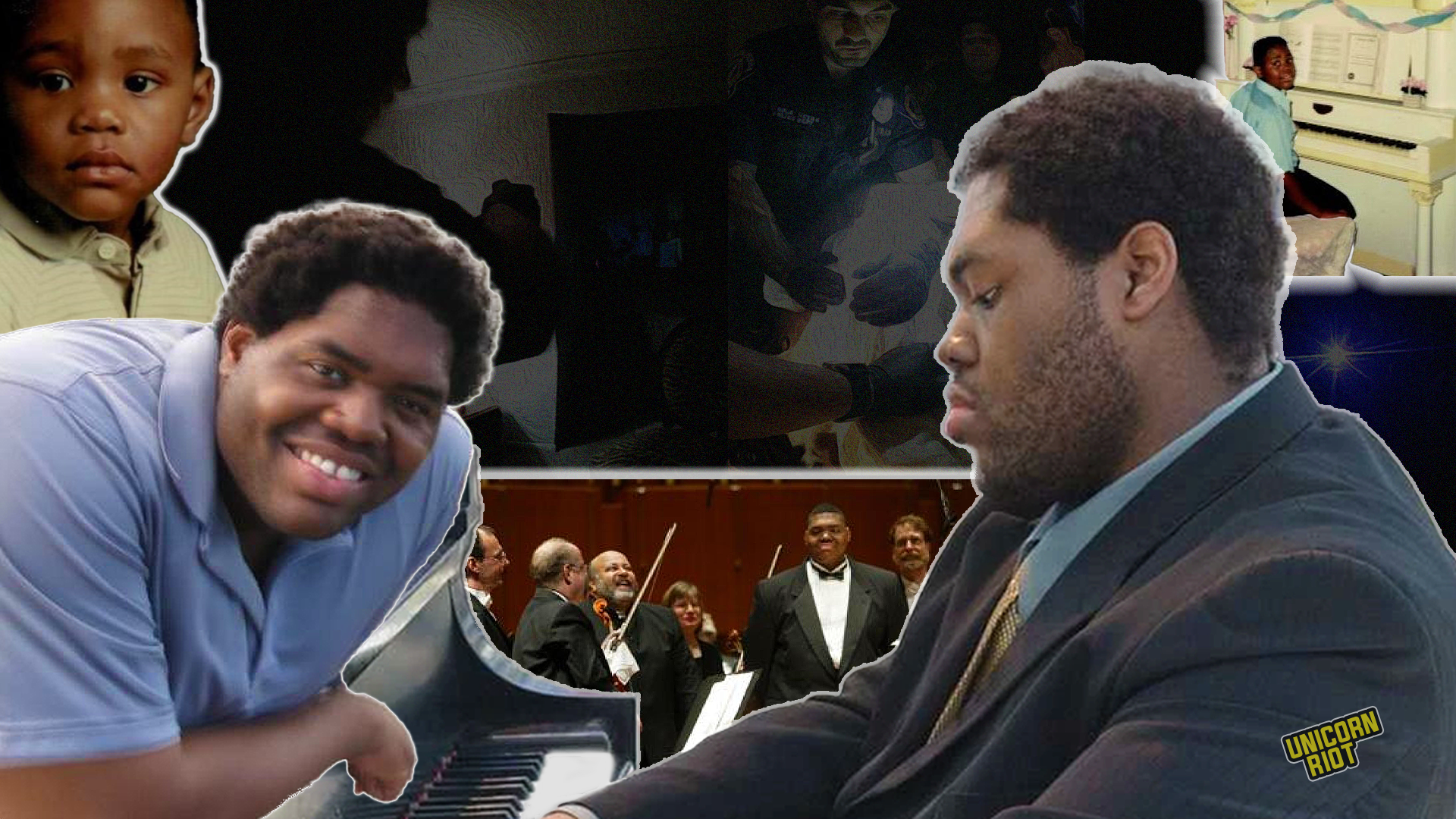Indianapolis Police on Trial for Tasing, Suffocating Musical Prodigy to Death
Indianapolis, IN — Responding to a call for medical help, police in Indianapolis tased, tackled, handcuffed and suffocated musical prodigy Herman Whitfield III to death on April 25, 2022. After being rescheduled numerous times, a five-day criminal trial started on Monday, Dec. 2, 2024 for two of the officers responsible for killing 39-year-old Whitfield III — Steven Sanchez and Adam Ahmad are both charged with manslaughter, reckless homicide, and battery. [UPDATE Dec. 6, 2024: Both officers were found not guilty on all counts.]
Content advisory: Documentation of police killing.
Volunteer organizers with the Justice for Herman Whitfield III Campaign spoke with Unicorn Riot about Whitfield’s call for help which turned into a gruesome case of police violence that was not widely covered in the media. Watch the video below.
Herman Whitfield III was naked and unarmed while experiencing a mental crisis in his parents’ Indianapolis home. His parents called 911 to get an ambulance. Instead of medical personnel, six Indianapolis Metropolitan Police (IMPD) officers — Steven Sanchez, Adam Ahmad, Matthew Virt, Dominique Clark, Jordan Bull, and Nicholas Mathew — showed up in pairs and killed Herman III within 15 minutes. Herman III had no criminal record.
While Ahmad and Sanchez face trial on paid administrative duty, none of the officers involved have faced disciplinary action by the IMPD and two have been promoted. Dominique Clark was promoted to sergeant and Matthew Virt got promoted to detective.
Herman’s family has demanded all six officers involved be fired and charged with killing Herman III and violating his civil rights along with the rights of his parents. The family has filed a wrongful death lawsuit (pdf) against IMPD and a federal lawsuit for violating the rights of Herman III’s parents.
‘I can’t breathe’ — Body-Worn Cameras Show Cruelty of Police Actions
After the killing, demands for body-worn cameras were made immediately by the Whitfields and activists in Indianapolis. These demands were ignored by the mayor and police chief.
Instead, by late June, IMPD published edited snippets of the videos and the 911 call with their narrated version of events. This version was spread through the news and regurgitated as fact for nearly a year. The parents, who witnessed their son get killed in their living room, said the police version created a false narrative that the officers faced some form of danger.
After the family filed a federal lawsuit, which is on hold until the criminal trial is over, the federal court ordered IMPD to hand over the unedited body-worn camera videos from the killing.
In January 2023, eight months after Herman III was killed, the family received 10 body-worn camera videos, six from responding officers on the scene and four more from officers who arrived at the Whitfield house after the incident.
Using the footage they procured, the family’s legal team put together their own video compilation and posted it to YouTube. This includes captions for important moments and pointing out police procedures that were being broken during certain times. Unicorn Riot also reviewed the videos that show a multi-angled view of the heartbreaking incident, some of which are posted in our video embedded above.
After calling for medical help and seeing IMPD arrive, the first thing Herman III’s father asked was “where’s the ambulance?” The police didn’t respond. In fact, an ambulance for Herman III didn’t come until at least three minutes after his last movement.
Upon arriving, IMPD officers Dominique Clark and Adam Ahmad were not able to persuade Herman III to come to the door and speak to them. After hearing them say to each other that another unit was also on its way and fearing for her son’s life, Herman III’s mother, Gladys, asked officer Clark, “They’re not going to kill him, are they?”
Three minutes after Clark and Ahmad arrived, IMPD officers Jordan Bull and Nicholas Mathew came into the house. They split up and moved through the home shining flashlights and started to encircle Herman III, who sat on his bed for several minutes, giving no response.
Five minutes later, officers Matthew Virt and Steven Sanchez entered the home, further surrounding Herman III.
With flashlights shining on him, and officers speaking about him going to the hospital and his parents attempting to get him dressed, Herman III walked fast through the hallway and the kitchen. When he entered the dining room, IMPD officer Steven Sanchez stunned him twice with his Taser.
Four officers then jumped on Herman III, with Sanchez holding his face against the carpet while Ahmad controlled his back. Some of Herman Whitfield III’s last words were “I can’t breathe,” which he muttered at least three times before having his breath snuffed out of him.

Dec. 6, 2024: Officers Found Not Guilty in Death of Herman Whitfield III
Power and Positional Asphyxia
In scenes similar to the 2020 murder of George Floyd, as Herman III was forced face down by officers, IMPD officer Adam Ahmad played the role of convicted killer Derek Chauvin and refused to allow other officers to roll Herman III over from being in a prone position on his stomach, despite being trained to sit people up after they’re handcuffed.
“The officers’ body cam videos show that shortly after Mr. Whitfield cried, ‘I can’t breathe,’ the third time, he did not move or [breathe] at all, yet the officers continued to put weight on him for three to four minutes before medics arrived. For over 25 years, the policing community has agreed that officers should not keep a restrained individual in the prone position because of the significant risk of positional asphyxia, i.e., suffocation because of body position. The City of Indianapolis, just as most metropolitan police departments do, trains its officers not to leave arrestees in this position after handcuffing, but instead to quickly sit them up to facilitate breathing.”
Complaint by Estate of Herman Whitfield III v. The City of Indianapolis, Steven Sanchez, Adam Ahmad, Matthew Virt, Dominique Clark, Jordan Bull, and Nicholas Mathew (Filed June 22, 2022)
As far back as 1995, the U.S. Department of Justice issued guidelines for police officers on positional asphyxia in an attempt to reduce the large number of in-custody deaths. The orders from the government read, “As soon as the suspect is handcuffed, get him off his stomach.”
However, from 2012 to 2021, police officers like Adam Ahmad across the country killed at least 740 people in similar prone position restraints.
About 16 minutes after police initially arrived at the Whitfields’, medical personnel entered and attempted to revive Herman III. They couldn’t. Herman Whitfield III was killed by police while in his parents’ home after they called for medical help.
Arriving to the scene after the killing and hearing Herman’s father say to the police that they were the “grim reapers,” IMPD officer Jason Mitchell admonished Herman III’s parents for questioning why officers would kill their son. Mitchell yelled and placed blame on them, saying at one point, “If you wouldn’t have called.”
This exchange was topped off with a calm Herman II repeating to IMPD why they called for help in the first place, “I had suggested that you call the medics and give him a shot to calm him down.” His wife Gladys responded, “They don’t give shots to big Black men, honey, big Black men get tased, get a foot on their neck, and get killed.”
Earlier in the night, as officers were in the process of killing Herman III, other officers got into a heated discussion with his parents, which got physical, over them not giving consent to the officers to search their home. This is part of the parents’ lawsuit against them.

IMPD: ‘I think it was excited delirium’
Not long after yelling at Herman III’s parents, officer Mitchell spoke to a superior officer on the phone saying they were in a waiting period between use-of-force and in-custody-death as they didn’t know if Whitfield had died yet — medics continued their attempts to resuscitate him.
While standing outside of the Whitfield’s home, IMPD Officer Dominique Clark finished her body-worn camera recording and said to Mitchell that she felt the cause of death was “excited delirium.”
Excited delirium is a term used by law enforcement that attempts to excuse cases of police killings that are done by suffocation and restraint — most typically prone position restraints. The medical community have shunned this explanation as racist pseudo-science and three states have recently restricted excited delirium as a cause of in-custody police deaths: California, Colorado, and Minnesota. [Unicorn Riot has covered at least three cases of police killings in Minnesota where authorities claim that the victim died from excited delirium — George Floyd, Nekeya Moody, and Lionel Lewis — in each case, law enforcement forcibly restrained the victims, each of whom were Black.]
Herman’s autopsy ruled his cause of death as a homicide by “cardiopulmonary arrest in the setting of law enforcement subdual, prone restraint, and conducted electrical weapon use.” The autopsy report (pdf) also noted numerous blunt force injuries to the head, neck, torso and leg of Herman Whitfield III, caused by IMPD officers.
Listed in the report, specifically as factors in Herman III’s death, was being restrained in the prone position and being tased. A 2017 Reuters investigation documented 1,005 incidents in the United States in which people died after police stunned them with Tasers.
Herman Whitfield Mattered
The indictment of Ahmad and Sanchez was only the second time the state brought charges against on-duty officers for police brutality.
“I think the game for the state is now chess. It’s no longer checkers, they can’t just hop over people,” said Daniel Brooks, a volunteer with the Justice for Herman Whitfield III Campaign. Brooks said more pressure is applied on prosecutors now and he attributes the charges against the two officers to the mass mobilizations from the George Floyd Uprising: “The people showed what they’re willing to do when people are being lynched.”
By all accounts, Herman III was an incredibly gentle, kind, loving and helpful person, said family friend and lead coordinator with the Justice for Herman Whitfield III, Dea Lott. She spoke to Unicorn Riot about his musical prowess. “From childhood, he was a prodigy. He was gifted in music. He earned degrees in composition, in piano performance, political science. He was an award winning and incomparable pianist and composer… You have to be an exceptional musician to even play his music,” said Lott.
Susan Kitterman, founder of Indianapolis Youth Orchestra and longtime friend and mentor to Whitfield said, “Because he was such an extraordinary person, it’s really easy to get caught up in his musical genius, and everything he did musically. But just as a person, his extraordinary kindness, and… his gentleness, and his sense of humor, and his ability to understand others and be patient was just really as much of a loss to this world as the music that he won’t write.”

An international team of volunteers has come together to help provide support for the family and push Herman III’s story. Another volunteer with the campaign, Jake Watkins, said, “It starts with the Whitfields, their strength has really laid the foundation.” Watkins added that seeing the family continue in the face of injustice “as they’re going through this process, it’s just been an inspiration.”
A fundraiser for the family organized by Lott is actively seeking donations “to support Herman’s parents and coordinate grassroots efforts to demand justice for Herman and his parents.”
Strange Fruit: Indiana, a White Supremacist State
From its inception as a state in 1816 through its Constitution — which prohibited Black people from entering the state — the fabric of Indiana’s institutions are draped in white supremacy. In the 1920s when the Ku Klux Klan was in its peak, Indiana held the largest Klan membership in the U.S. with 30% of the population enrolled as Klan members.
In 1930, in Marion, Indiana — 70 miles northeast of Indianapolis — a white mob broke into a jail to kidnap and lynch three Black youth. Two of the youth, Thomas Shipp and Abraham Smith, were beaten and hung from a tree while another, James Cameron, was saved.
This incident led to the famous anti-lynching song Strange Fruit, first written as Bitter Fruit by Abel Meeropol, after Meeropol saw an image of the Shipp and Smith lynching. Strange Fruit was popularized by Billie Holiday — which led to her being targeted by the government — and Nina Simone. James Cameron went on to found and direct America’s Black Holocaust Museum, the first ever museum dedicated to telling the history of America’s involvement in the Black Holocaust. [See the museum’s online galleries here.]
Anti-Blackness continues to permeate Indiana to this day. A flashpoint of modern police relations with Indianapolis’ Black community was the 1987 police killing of 16-year-old Michael Taylor while he was handcuffed in the back of a police car.
Police Kill ~41 Civilians in 9 Years
Black people in Indiana are five times more likely to be killed by police than their white counterparts. However, police have also killed dozens of white people over the years. Six years ago in November, IMPD fatally shot a retired police officer, Daniel Cedars, through his front door. Cedars’ estate was awarded $1.2 million after a civil jury found two officers used unreasonable force.
“IMPD has one of the worst records for human rights violations in the country. Yet and still, nobody really hears about anything that is going on [in Indianapolis].”
Dea Lott, volunteer lead coordinator Justice for Herman Whitfield III Campaign
In a similar case to the killing of Herman III, in 2019 IMPD responded to a mental crisis help call and wound up killing Eleanor Northington, a 43-year-old Black woman, by suffocating her to death in her own church. No officers were charged. A jury awarded the family $500,000 after they filed a civil suit.
Since the brutal killing of Whitfield III, police killings and shootings have become such a common occurrence, at least 13 in 2023, that the U.S. Department of Justice’s office of Community Oriented Policing Services (COPS) and the National Policing Institute have been called in by the new police chief to do a review of the IMPD.
Officers Found Not Guilty in Death of Herman Whitfield III
Cover image by Niko Georgiades for Unicorn Riot – images via Whitfield family and Sarah Nelson.
Follow us on X (aka Twitter), Facebook, YouTube, Vimeo, Instagram, Mastodon, Threads, BlueSky and Patreon.
Please consider a tax-deductible donation to help sustain our horizontally-organized, non-profit media organization:



